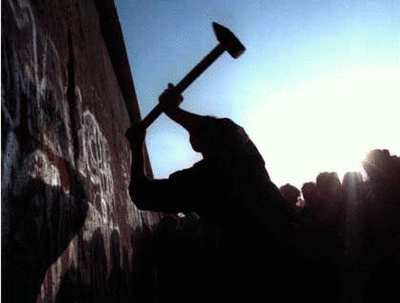
From the fall of the Berlin Wall to the European integration process, via the dissolution of Yugoslavia. The controversial heritage of Communism in Europe, made of nostalgia, social injustice and demand for security. An interview with Slavenka Drakulić
Slavenka Drakulić is a Croatian writer and publicist. Among her works: Marble Skin (1995), How We Survived Communism and Even Laughed (1991), The Taste of a Man (1997), Cafe Europa: Life After Communism (1996), Balkan Express: Fragments from the Other Side of the War (1992), They Would Never Hurt a Fly - War Criminals on Trial in The Hague (2004), Fridas' Bed (2008)
What are your personal recollections of the day the Berlin Wall fell, what were your expectations when you heard the news?
I visited Berlin, East and West, several times while the Wall still existed. I had friends on both sides. I also visited Museum of the Wall at Checkpoint Charlie - a really unique, fascinating place. It looked quite surreal to watch the wall going down on a TV. It was clearly a historical and highly symbolic moment. Dismantling the wall meant dismantling of communism, literally bringing it down to rubble.... It was also very moving to see people jumping up, meeting , hugging, and crying. I had to pinch myself, but it did not become real until I visited Berlin again and see that the wall wasn't there any longer. It disappeared quickly, perhaps too quickly. I can understand a desire to abolish it completely, but on the other hand, perhaps big parts should have been kept as a monument of human stupidity. Now there is a risk that future generations would say: Wall? What wall? Already there is such a risk with communism: Communism? What communism?
How was the news broadcasted and what were the reactions of the public in ex-Yugoslavia?
I was not in Yugoslavia at the time, I was in the USA - of course, it was presented in a triumphant way.
Could you expect, at that time, the violence that would have erupted in your country in the cycle of events following the fall of the Berlin Wall?
In Yugoslavia at that time, in 1989, for several years there had been a series of nationalist mass manifestations, especially in Serbia. The so-called "hate speech" was at its peak. Mass media were reduced to propaganda machines, spreading nationalism like a fire. The fact is that you first need to psychologically prepare people for the war. I know that from the outside it looked as if wars (in Croatia and Bosnia) happened overnight. But that is not true - preparations were going on for at least five years. Our problem in Yugoslavia was that we were the very last believers in our kind of "socialism with a human face". We, especially my generation, did not create a democratic political alternative in time - while nationalists were ready to take over and fulfil their dreams of a nation-state. Yet, no one expected such violence and carnage...
In many Eastern and Central European countries the former dissidents are now (or have become) part of the ruling elite. Why has it not been so in ex-Yugoslavian countries, where the intellectuals have mostly been ostracised in the transition and are often still abroad?
Our situation in Yugoslavia was very different from countries in the Soviet bloc. As I said, we had no democratic alternative, no political party or even a group ready to take over. There was no Vaclav Havel. Besides, intellectuals (professors, academics, journalists, writers) were very much engaged in the nationalist politics. They were in charge of disseminating nationalism over mass media. Intellectuals played an extremely negative role - think of Radovan Karadzić or Dobrica Ćosić, for example. On the other hand, a few critical, anti-nationalist intellectuals that dared express different opinions were persecuted and nationalist, authoritarian governments proclaimed them traitors.
In the introduction to your How we survived communism and even laughed, you spoke about communism as being more than a mere ideology, somehow a state of mind. Does this state of mind still exist?
I wrote about a communist mentality. When you live for several generations under communism, it is natural that you develop certain values and habits, a way of thinking and behaving. And, it is not easy to get rid of the old habits. This is one of reasons for inertia. It was easy before; all faults and problem one could blame on the government and the communism party. I think that this mentality is evident in the fact that people in the former countries have great difficulty to accept personal responsibility, from the top down. Responsibility is not a familiar concept to them. It cannot be developed in the mass society, where individualism is proscribed. Nowadays, even twenty years after the political changes, lack of responsibility still creates a lot of problems. This tells you how slowly a communist mindset changes.
20 years later, how would you describe the difference between surviving communism and surviving post communism? Which are the different needs, challenges, strategies?
Only a couple of months ago I would have given you an optimistic answer. But after the collapse of the financial market and a period of a recession that we just entered, it is hard to speak about strategy for that part of Europe... The economy in former communist countries depends entirely upon foreign capital. Therefore, one could expect that they will be hit hard - although, so far, they deny it. Withdrawal of capital, closing of factories, slowing down of building industry, collapse of banks means a growth of unemployment and poverty and growth of frustrations. This cannot bring anything good. We already witnessed rise of nationalism (see Hungary) and populism. I am afraid that these societies (of course, there is a difference between Czech Republic and Romania, for example) are not democratic enough and they don't have developed mechanisms to deal with difficult situations like this one - therefore, one could expect political destabilization. In a way, this is not fair: you let them into "Europe", they taste a cake - and then you take it away from them! My hope is that these societies are still peasant and patriarchal and this will actually save them in the crisis.
Has Europe grown stronger, as a political actor, in these 20 years after the fall of the Berlin Wall?
I can't say that. EU is still a cluster of nation-states, each state taking care of its own interest above everything else. EU doesn't have a common foreign politics, cultural politics, energy politics.... It was very clear to everyone just last month, when there was no Russian gas coming through Ukraine. Each country lobbied for itself, tried to find an individual - not a common! - solution. EU needs to develop "togetherness" i.e. common interest, it needs a glue to hold us together. It has a huge, slow and expensive bureaucracy that acts by prohibition. We will see what will happen during this financial crisis, how much feeling of belonging together will be demonstrated through the financial aid to the former communist countries. I am aware that what I say sounds critical. But of course, I am not against it, I just want it to improve.
Have former communist countries contributed to the re-unification of Europe or did they passively tolerate the European integration process?
My impression is that these countries (some more, some less) worked hard on trying to trick EU! They pretended that they work on reforms, but actually it is a kind of game: we will give a good impression and then, when we are inside, we just continue to do what we did before. Look at Romania or Bulgaria for the corruption case or stealing of public funds. Look also at Croatia, preparing to enter EU - are they really reforming , for example, their judicial system - or just "reforming" it? The problem is that, after you are in, there is less chance to reprimand a country for, say corruption or lack of democracy, etc.
Does a wall still exist between Eastern and Western Europe?
Yes, it does. Ordinary people still have a feeling that they are treated like second-class citizens. They are right. Differences between two blocs - economic, political, historical, and social - were too big to bridge in only two decades. Two decades are not long in terms of history. The good example is the united Germany. When you take a closer look, you see that unification is very slow and that in fact, Germany is still a divided country. If this is the case, what could we expect for other countries from the former bloc?
Nostalgia for communism has emerged immediately after the fall of the Berlin Wall. How would you describe this phenomenon? Is there something of that system worth keeping, besides the red stars, icons of Stalin and Lenin and other objects sold in flea markets?
You are right about nostalgia. It is easy to understand because people who were more than thirty years old when the change happened are losers. An immense political change happened in the middle of their life. Suddenly, they found themselves without a job, without security, without money - assaulted by consumer capitalism and its values. How would you feel? However, this nostalgia is misinterpreted. It is not longing for a communist regime, but for security people felt then. Yes, they were not free, but they were secure. Now they are free, but insecure.... I recently travelled to Romania, Bulgaria, Slovakia, Czech Republic - and I do think people there seriously miss something: social justice.







